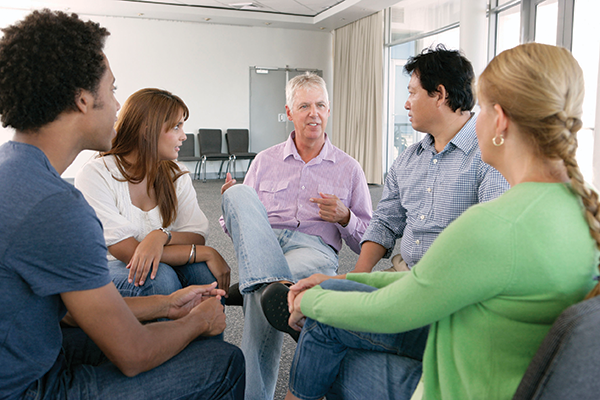What about a Support Group?
by Mary C. McCarthy, BSN, RN-BC
Support groups are frequently recommended for people who are facing a change or challenge in life. Groups of people gathering for information, help, and networking is nothing new. A cancer diagnosis often leads a person or a family to find a support group.
For over twenty years, I have facilitated support groups for people dealing with cancer, chronic obstructive pulmonary conditions, diabetes, an ostomy, and stroke. My role as a facilitator is to provide a comfortable forum for people to gather with peers. I am often asked, “What do people talk about in that group?” The answer is anything and everything participants wish to discuss and share. A group can be a safe place for people to give and receive emotional, informational, and practical support.
Emotional support involves being able to discuss issues without fear of privacy being compromised. What happens in the support group stays in the support group. Confidentiality is sacred.
People face a variety of emotions when dealing with a change in health. Often a group participant can help someone “normalize” the emotional aspect of a situation. Whether the emotion is fear, anxiety, or feeling overwhelmed, it can be helpful to learn how others have dealt with similar emotions.
Whether the emotion is fear, anxiety, or feeling overwhelmed, it can be helpful to learn how others have dealt with similar emotions.
Being with people “who get it” can have benefits as well as disadvantages. The benefits can be shared strategies or methods for coping. Negative aspects of emotional sharing can be shouldering everyone’s problems without any discussion of how to move forward in a healthy way or feeling ashamed that a particular emotion was identified and shared.
Informational support can come in a variety of ways in a group. The goal is to have reliable and evidence-based information on topics such as activity, diet, finances, relationships, returning to work, and coping with change. Groups are not a substitute for medical or psychological care. However, over time people become very knowledgeable about conditions, treatment, and self-care. A peer can often be very wise about an aspect of a situation that a group member may be in question or concerned about. Also, inviting a guest expert speaker can be a plus for the group to learn about a specific topic.
Practical support involves aspects of daily living. For example, clothing is a common topic in the different groups I have worked with. Women share ideas on the best style of blouse, shirt, or vest to wear after breast surgery. People with ostomies talk about pants, waistbands, underwear, and swimsuits. Discussions on head coverings are always lively and full of creative suggestions. Tips and problem solving on clothing are prime examples of participants dealing with day-to-day issues.
I have found that people who attend a support group have great courage and willingness to share and learn from others. It might be easier to sit at home and not engage with others versus going to a group. Meeting new people at a time of change can offer fresh and different perspectives. Gratitude for connecting with people who are on a similar path is an outcome that I have heard from many group participants.
As a group facilitator, my hope is that people leave the meetings feeling comforted even in a small way or learning helpful information. Support groups do not have to be pity parties. I see them as a gathering of brave people who wish to connect, share, and learn from others.

Mary McCarthy is the patient education coordinator at Mercy Hospital in Iowa City, IA.
This article was published in Coping® with Cancer magazine, January/February 2016.


